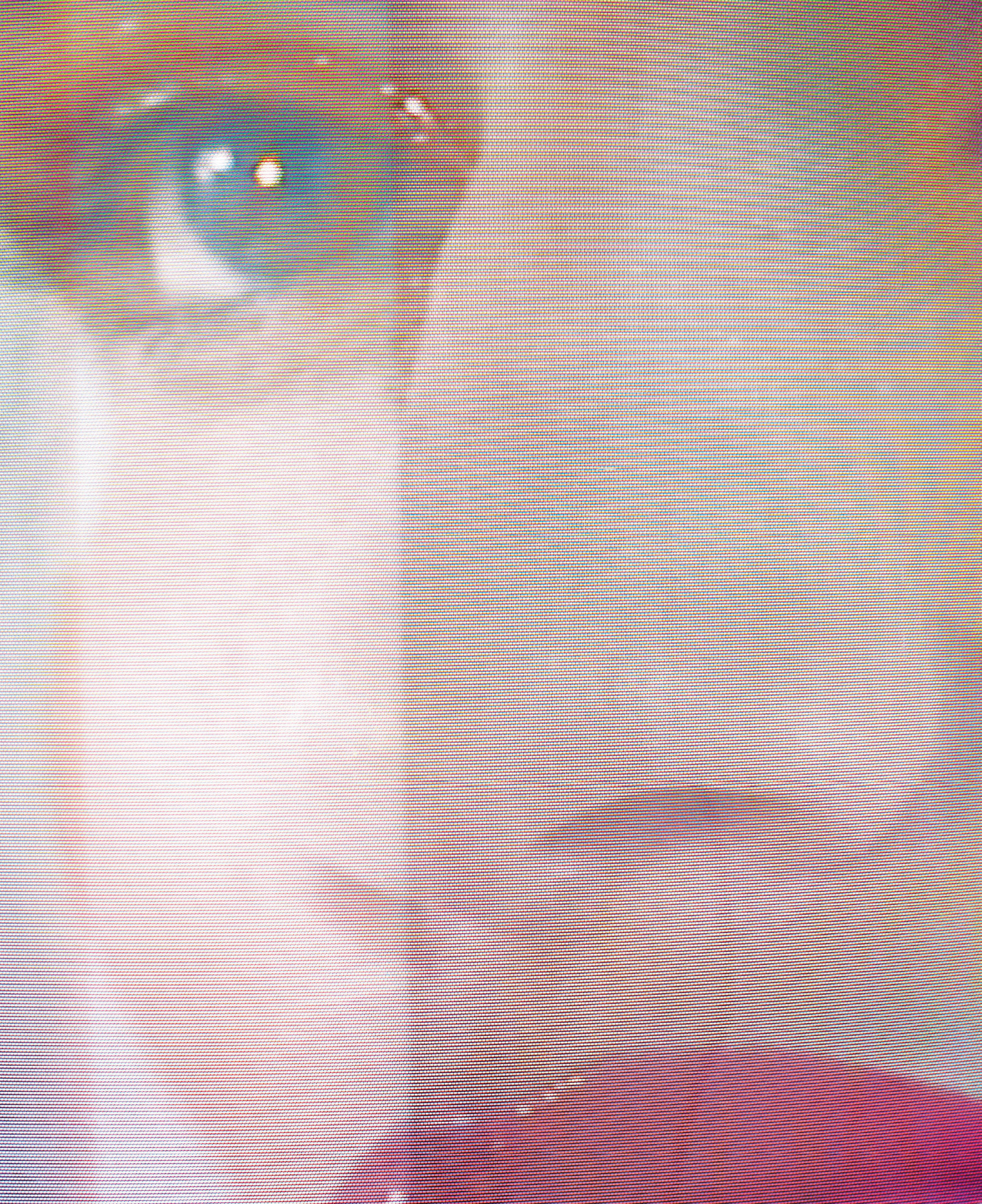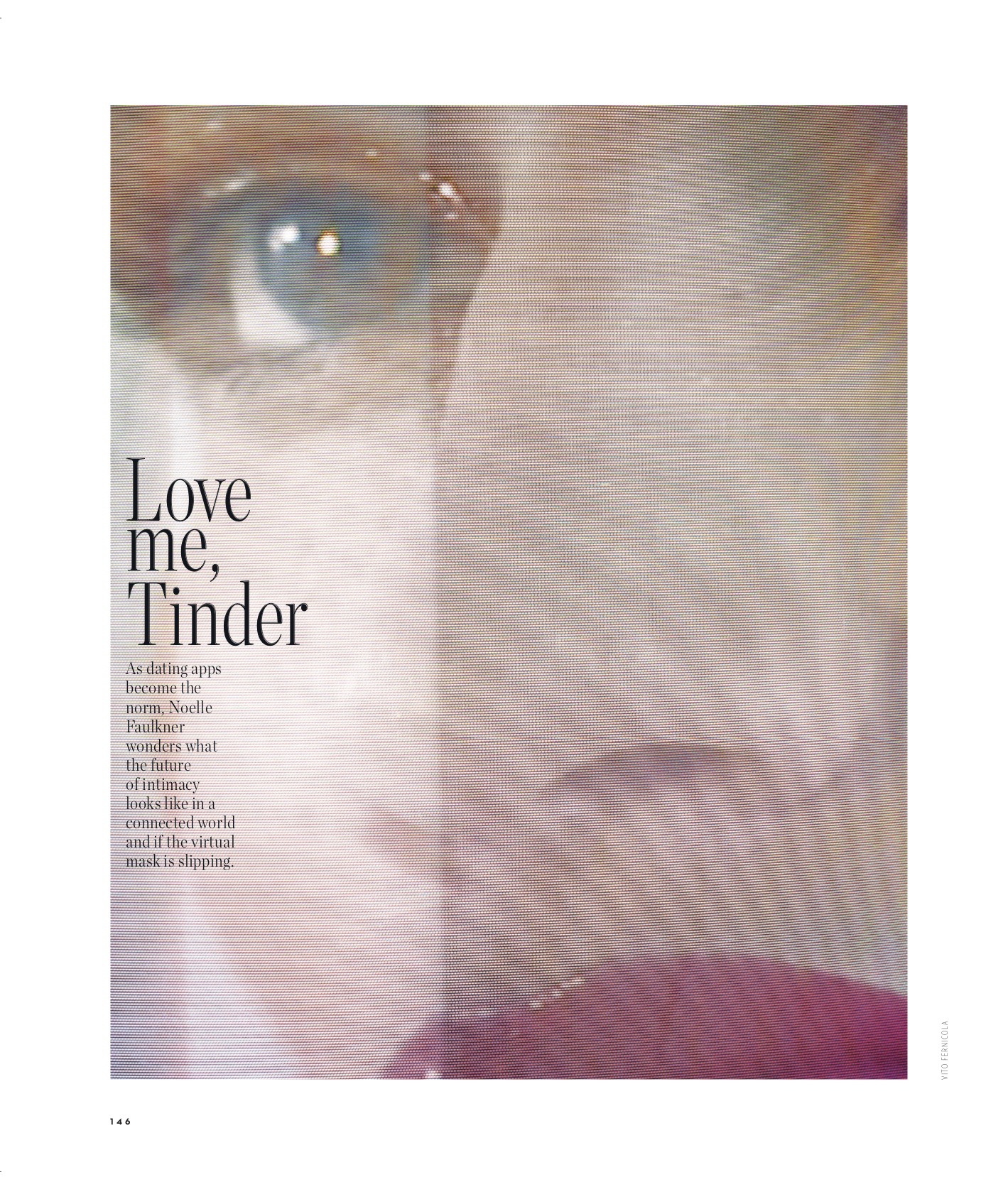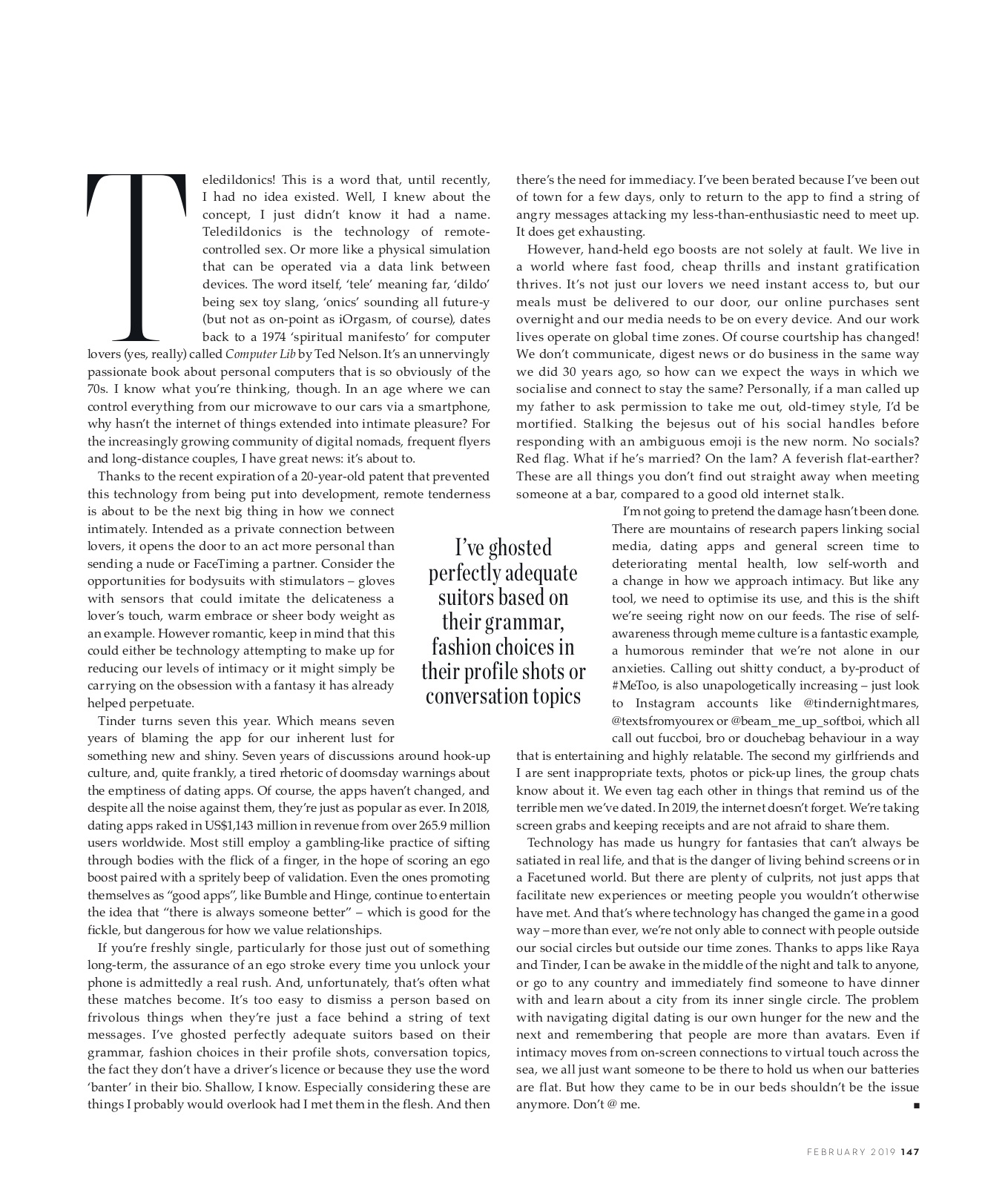
VOGUE, March 2019 (PDF)
As dating apps become the norm, Noelle Faulkner
wonders what the future of intimacy looks like in a connected world and if the virtual mask is slipping.
Teledildonics! This is a word that, until recently, I had no idea existed. Well, I knew about the concept, I just didn’t know it had a name. Teledildonics is the technology of remote controlled sex. Or more like a physical simulation that can be operated via a data link between devices. The word itself, ‘tele’ meaning far, ‘dildo’ being sex toy slang, ‘onics’ sounding all future-y (but not as on-point as iOrgasm, of course), dates back to a 1974 ‘spiritual manifesto’ for computer lovers (yes, really) called Computer Lib by Ted Nelson. It’s an unnervingly passionate book about personal computers that is so obviously of the '70s. I know what you’re thinking, though. In an age where we can control everything from our microwave to our cars via a smartphone, why hasn’t the internet of things extended into intimate pleasure? For the increasingly growing community of digital nomads, frequent flyers and long-distance couples, I have great news: it’s about to.
Thanks to the recent expiration of a 20-year-old patent that prevented this technology from being put into development, remote tenderness is about to be the next big thing in how we connect intimately. Intended as a private connection between lovers, it opens the door to an act more personal than sending a nude or FaceTiming a partner. Consider the opportunities for bodysuits with stimulators – gloves with sensors that could imitate the delicateness a lover’s touch, warm embrace or sheer body weight as an example. However romantic, keep in mind that this could either be technology attempting to make up for reducing our levels of intimacy or it might simply be carrying on the obsession with a fantasy it has already helped perpetuate.
Tinder turns seven this year. Which means seven years of blaming the app for our inherent lust for something new and shiny. Seven years of discussions around hook-up culture, and, quite frankly, a tired rhetoric of doomsd something new and shiny. Seven years of discussions around hook-up culture, and, quite frankly, a tired rhetoric of doomsday warnings about the emptiness of dating apps. Of course, the apps haven’t changed, and despite all the noise against them, they’re just as popular as ever. In 2018, dating apps raked in US$1,143 million in revenue from over 265.9 million users worldwide. Most still employ a gambling-like practice of sifting through bodies with the flick of a finger, in the hope of scoring an ego boost paired with a spritely beep of validation. Even the ones promoting themselves as “good apps”, like Bumble and Hinge, continue to entertain the idea that “there is always someone better” – which is good for the fickle, but dangerous for how we value relationships.
If you’re freshly single, particularly for those just out of something long-term, the assurance of an ego stroke every time you unlock your phone is admittedly a real rush. And, unfortunately, that’s often what these matches become. It’s too easy to dismiss a person based on frivolous things when they’re just a face behind a string of text messages. I’ve ghosted perfectly adequate suitors based on their grammar, fashion choices in their profile shots, conversation topics, the fact they don’t have a driver’s licence or because they use the word ‘banter’ in their bio. Shallow, I know. Especially considering these are things I probably would overlook had I met them in the flesh. And then there’s the need for immediacy. I’ve been berated because I’ve been out of town for a few days, only to return to the app to find a string of angry messages attacking my less-than-enthusiastic need to meet up. It does get exhausting.
However, hand-held ego boosts are not solely at fault. We live in a world where fast food, cheap thrills and instant gratification thrives. It’s not just our lovers we need instant access to, but our meals must be delivered to our door, our online purchases sent overnight and our media needs to be on every device. And our work lives operate on global time zones. Of course courtship has changed! We don’t communicate, digest news or do business in the same way we did 30 years ago, so how can we expect the ways in which we socialise and connect to stay the same? Personally, if a man called up my father to ask permission to take me out, old-timey style, I’d be mortified. Stalking the bejesus out of his social handles before responding with an ambiguous emoji is the new norm. No socials? Red flag. What if he’s married? On the lam? A feverish flat-earther? These are all things you don’t find out straight away when meeting someone at a bar, compared to a good old internet stalk.
I’m not going to pretend the damage hasn’t been done.
There are mountains of research papers linking social media, dating apps and general screen time to deteriorating mental health, low self-worth and a change in how we approach intimacy. But like any tool, we need to optimise its use, and this is the shift we’re seeing right now on our feeds. The rise of self awareness through meme culture is a fantastic example, a humorous reminder that we’re not alone in our anxieties. Calling out shitty conduct, a by-product of #MeToo, is also unapologetically increasing – just look to Instagram accounts like @tindernightmares, @textsfromyourex or @beam_me_up_softboi, which all call out fuccboi, bro or douchebag behaviour in a way that is entertaining and highly relatable. The second my girlfriends and I are sent inappropriate texts, photos or pick-up lines, the group chats know about it. We even tag each other in things that remind us of the terrible men we’ve dated. In 2019, the internet doesn’t forget. We’re taking screen grabs and keeping receipts and are not afraid to share them.
Technology has made us hungry for fantasies that can’t always be satiated in real life, and that is the danger of living behind screens or in a Facetuned world. But there are plenty of culprits, not just apps that facilitate new experiences or meeting people you wouldn’t otherwise have met. And that’s where technology has changed the game in a good way – more than ever, we’re not only able to connect with people outside our social circles but outside our time zones. Thanks to apps like Raya and Tinder, I can be awake in the middle of the night and talk to anyone, or go to any country and immediately find someone to have dinner with and learn about a city from its inner single circle. The problem with navigating digital dating is our own hunger for the new and the next and remembering that people are more than avatars. Even if intimacy moves from on-screen connections to virtual touch across the sea, we all just want someone to be there to hold us when our batteries are flat. But how they came to be in our beds shouldn’t be the issue anymore. Don’t @ me.

